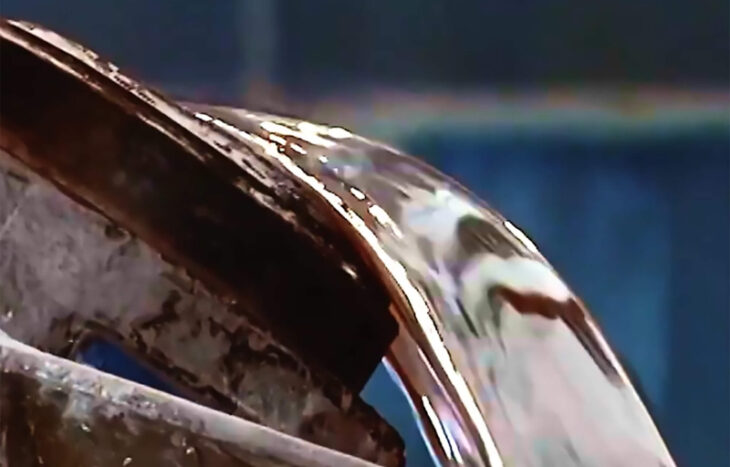Alcoa has developed a new, patented process for the purification of post-consumer aluminum scrap. This ASTREA™ process is designed to process low quality scrap (such as zorba, which is comprised of shredded aluminum and other nonferrous metals from automobiles) into an extremely high purity level equivalent to or surpassing P0101 aluminum alloys (containing only 0.1% silicon and 0.2% iron) produced in a commercial smelter.
According to the International Aluminium Institute (IAI), the industry needs to increase post-consumer scrap recycling by 55% by 2030 (compared to 2018 levels) in order to achieve industry decarbonization goals for the 1.5-degree scenario outlined in the Paris Agreement. However, a vast quantity of aluminum scrap — particularly zorba — is not fully utilized, with the majority of supply being shipped to Asia. For example, the U.S. alone produces approximately 4 million tons of zorba annually, approximately 1.3 million tons of which is shipped to Asia.
Due its combination of impurities, the industry is unable to remove trace metals from this scrap, which means that it cannot be used in many rolling or extrusion applications designed for automotive or aerospace. As a result, aluminum processed from zorba is often used to make engine blocks for gas-powered cars, which can tolerate less-pure scrap as a raw material.
The market for zorba and low-value aluminum scrap is slowly diminishing as the automotive industry shifts its focus toward electric vehicles. This is because electric vehicles require higher-purity aluminum for their motors and other components.
Alcoa’s ASTRAEA process was designed specifically to target zorba and low-value aluminum scrap by enabling the processing of any post-consumer aluminum scrap, regardless of alloy combination, and achieve an extremely high purity. In turn, this super-pure metal could then be blended with less pure scrap to produce a metal that meets the required purity thresholds required by most rolling and extrusion applications — vastly improving the supply of post-consumer scrap that can be used as a raw material.
Sustainability Roadmap
The ASTRAEA recycling process is just one of the key objectives in Alcoa’s technology roadmap, which supports the company’s vision towards a more sustainable future for the aluminum industry. The roadmap also helps support the company’s pathway to reaching net zero greenhouse gas (GHG) emissions by 2050 across its global operations, including Scope 1 and Scope 2 emissions.
Additional roadmap objectives include a new Refinery of the Future program and the Elysis joint venture project. Combined, these developments have the potential to decarbonize a significant portion of the upstream aluminum supply chain and provide a competitive advantage in a carbon-constrained world.
“Our technology roadmap represents an array of next-generation solutions that could significantly reduce emissions across the upstream value chain and concurrently generate significant stockholder value,” said Roy Harvey, Alcoa president and CEO. “Our Refinery of the Future design and the ELYSIS zero carbon smelting technology, as just two examples, not only aim to reduce costs and improve efficiency in aluminum production, but target complete reduction of GHG generation from their respective production processes.”
The Refinery of the Future program aims to utilize a host of technologies and processes to design a refinery that lowers capital intensity, eliminates carbon emissions, and addresses other industry challenges, including reducing or eliminating bauxite residue. From the environmental perspective, the program will be designed around two technologies – electric calcination and mechanical vapor recompression (MVR).
Electric calcination allows for a self-enclosed calciner operating environment that captures steam and allows the calciner to be connected to a renewable-powered electric grid. The technology also retains all the water from the original feedstock.
MVR is a renewable energy-powered process that recycles low-pressure steam in the refining process, offering the potential to reduce carbon emissions in alumina refining by up to 70%. Alcoa is currently evaluating the application of this technology in Australia with the support from an $11M grant from the Australian Renewable Energy Agency (ARENA). The process reduces water consumption by up to 35%.
The Elysis joint venture technology is designed to eliminate all direct GHGs from the traditional smelting process. The breakthrough process uses next-generation electrode design and proprietary materials first developed at the Alcoa Technical Center and emits pure oxygen as a byproduct at a lower operating and capital cost than conventional technology. Currently, Elysis is moving toward commercial demonstration of this technology.

